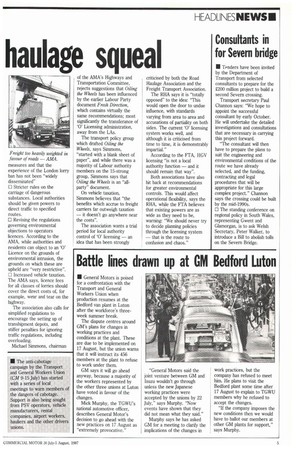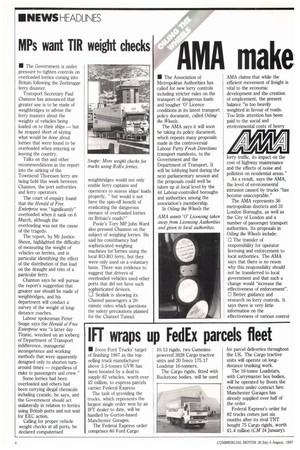haulage squeal
Page 7

Page 6

If you've noticed an error in this article please click here to report it so we can fix it.
• The Association of Metropolitan Authorities has called for new lorry controls including stricter rules on the transport of dangerous loads and tougher '0' Licence conditions in its latest transport policy document, called Oiling the Wheels, The AMA says it will soon be taking its policy document, which repeats many proposals made in the controversial Labour Party Fresh Directions transport manifesto, to the Government and the Department of Transport. It will be lobbying hard during the next parliamentary session and the proposals could well be taken up at local level by the 44 Labour-controlled boroughs and authorities among the association's membership.
In Oiling the Wheels the AMA claims that while the efficient movement of freight is vital to the economic development and the creation of employment, the present balance "is too heavily weighted in favour of roads. Too little attention has been paid to the social and environmental costs of heavy lorry traffic, its impact on the cost of highway maintenance and the effects of noise and pollution on residential areas."
As a result, says the AMA, the level of environmental intrusion caused by trucks "has become unacceptable."
The AMA represents 36 metropolitan districts and 31 London Boroughs, as well as the City of London and a number of passenger transport authorities. Its proposals in Oiling the Wheels include: .0 The transfer of responsibility for operator licensing and enforcement to local authorities. The AMA says that there is no reson why this responsibilty should not be transferred to local government and that such a change would "increase the effectiveness of enforcement". 0 Better guidance and research on lorry controls. It says there is very little information on the effectiveness of various control
Freight too heavily weighted in favour of roads — AMA. measures and that the experience of the London lorry ban has not been "widely disseminated" El Stricter rules on the carriage of dangerous substances. Local authorities should be given powers to direct traffic to specified routes.
0 Revising the regulations governing environmental objections to operators licences. According to the AMA, while authorities and residents can object to an '0' Licence on the grounds of environmental intrusion, the grounds on which these are upheld are "very restrictive". El Increased vehicle taxation. The AMA says, licence fees for all classes of lorries should cover the direct costs of, for example, wear and tear on the highway.
The association also calls for simplified regulations to encourage the setting up of transhipment depots, and stiffer penalties for ignoring traffic regulations, including overloading.
Michael Simmons, chairman of the AMA's Highways and Transportation Committee, rejects suggestions that Oiling the Wheels has been influenced by the earlier Labour Party document Fresh Direction, which contains virtually the same recommendations; most significantly the transferance of '0' Licensing administration, away from the LAs.
The transport policy group which drafted Oiling the Wheels, says Simmons, "started with a blank sheet of paper", and while there was a majority of Labour authority members on the 15-strong group, Simmons says that Oiling the Wheels is an "allparty" document.
On vehicle taxation, Simmons believes that "the benefits which accrue to freight carriers far outweigh taxation — it doesn't go anywhere near the costs".
The association wants a trial period for local authority control of '0' licensing — an idea that has been strongly criticised by both the Road Haulage Association and the Freight Transport Association.
The RHA says it is "totally opposed" to the idea: "This would open the door to undue influence, with standards varying from area to area and accusations of partiality on both sides. The current '0' licensing system works well, and although it is criticised from time to time, it is demonstrably impartial."
According to the FTA, HGV licensing "is not a local authority function — and it should remain that way".
Both associations have also hit back at recommendations for greater environmental controls. This would affect operational flexibility, says the RHA, while the FTA believes that existing powers are as wide as they need to be, warning: "We should never try to decide planning policies through the licensing system — that is the route to confusion and chaos."




















































































































